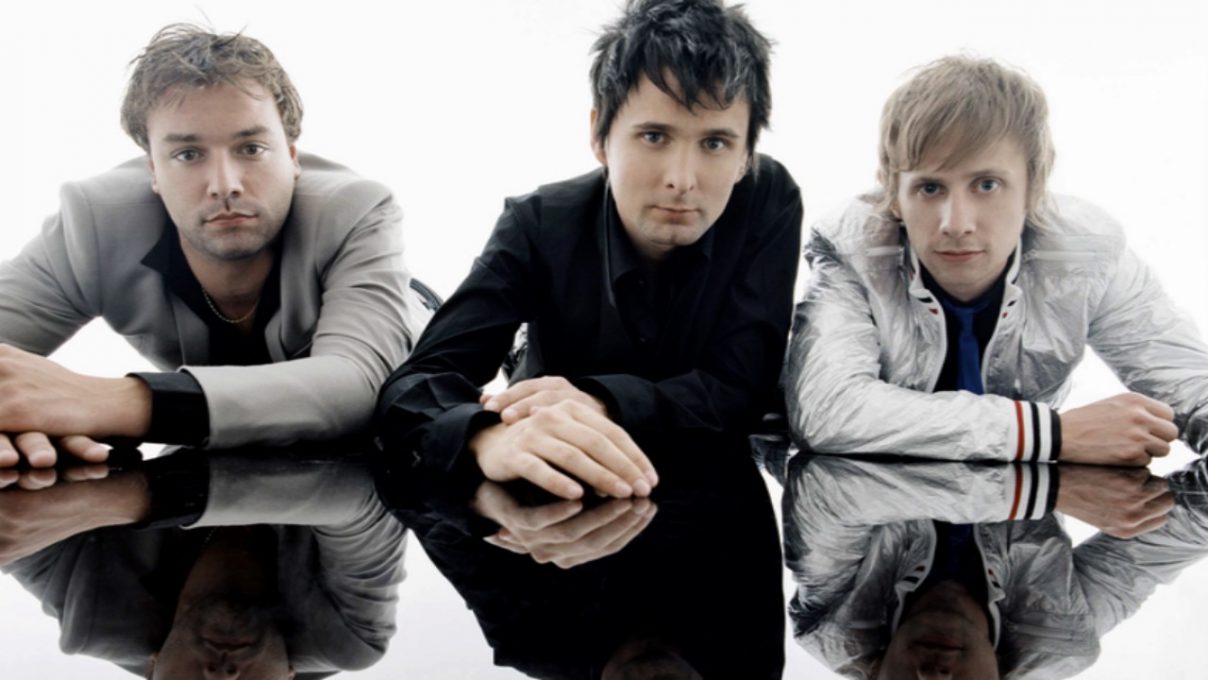Interview: There’s no conspiracy theories to Muse’s success

Chris Wolstenholme, Matt Bellamy and Domenic Howard of Muse, courtesy.
This story originally appeared in the Oakland Tribune.
Conspiracy theories, biblical apocalypse and little green men.
Muse bassist Chris Wolstenholme swears that despite the fact that the majority of the band’s songs revolve around one of the three, the trio isn’t only about paranoid “end is near” fanatics.
“We all have our moments,” he said in a telephone interview before a recent show in St. Louis. “We are able to switch it on and off, though. We don’t always talk about science fiction, religion and conspiracy theory.”
Yet it’s hard to deny the importance of other-worldly elements in Muse’s music. The British band, which plays the Download Festival in Mountain View on Saturday, features frontman Matthew Bellamy’s lyrics and high-pitched vocals (Bellamy also plays guitar and keyboards) combined with Dominic Howard’s drumming and Wolstenholme’s bass in a flashy style that even has been compared to opera.
The band draws many of its themes from Bellamy’s interests in the supernatural and theology. For example, “Ruled By Secrecy” off the CD “Absolution” shares a name with a political conspiracy theory novel written by Texas journalist Jim Marrs.
“Space Dementia,” off “Origin of Symmetry,” is about a mental disorder identified by astronauts who spend prolonged periods of time in space.
Want more? The cover of Muse’s new album, “Black Holes and Revelations,” shows the Four Horsemen of the Apocalypse sitting around a table with four miniature horses on the surface of Cydonia, the name for a region on Mars (as well as the name of city-state in ancient Greece). The album’s first single is called “Knights of Cydonia.”
The band’s first album, “Showbiz,” depicts a woman running along the surface of another planet on the cover.
“The conspiracy side is something a lot of people think about right now,” Wolstenholme says. “We can’t just believe everything our government tells us. He (Bellamy) is expressing more global opinions.
“The sci-fi thing is something we’re all interested in. We used to watch a lot of (sci-fi shows and movies) on the bus until poker took over.”
Muse formed in 1994 after Bellamy, Howard and Wolstenholme played in competing bands at the same school. At their first show, a battle of the bands competition, the three decided the best way to win was to trash the instruments that were shared by all the bands, and it worked.
“We were 15 and 16 at the time and had been a band for only six weeks,” Wolstenholme says.
Several British labels passed on the band’s unique glamrock delivery and Bellamy’s frequent falsettos; the group’s first three albums were produced by the owner of their recording studio.
Maverick Records signed the band before the 1998 U.S. release of its second album, “Origin of Symmetry,” but label executives didn’t like Bellamy’s vocals and asked the band to change them. Instead, Muse left the label altogether and the album went unreleased here until last year.
“They didn’t understand it,” Wolstenholme says. “There was no point in having a record label that wasn’t going to release a record.”
“Absolution” followed in 2004. Two of its singles — “Time is Running Out” and “Hysteria” hit the U.S. modern rock chart.
Playing up to its sci-fi image while touring in 2005, the members of Muse left anagram clues hidden in set lists. The few who deciphered the clues received an e-mail that told them of three locations where the band locked up autographed bicycles.
“We just thought we would have a laugh at that,” Wolstenholme says.
What really happened was that the band bought three bicycles to ride for themselves while on tour, which they “obviously couldn’t take back home.”
Released this year, “Black Holes and Revelations” marks Muse’s first mainstream success in the United States. The album hit No. 9 on the Billboard 200 a few weeks ago. It also scored several international No. 1’s and was nominated for the 2006 Mercury Music Prize in the United Kingdom.
While the band is used to playing sold-out stadiums in Europe and the UK, here in America the band, which has been compared to Radiohead, often has been ignored.
Wolstenholme concedes that Bellamy’s vocals are similar to Thom Yorke’s, but says the comparisons should end there. A more appropriate comparison, he says, would be to Queen, had Brian May decided to go metal.
Another influence is the Romanticist piano movement, especially Sergei Rachmaninov. Bellamy has thrown in musical bits of Rachmaninov in live shows and in recordings.
“I find the Radiohead thing quite funny because we really don’t listen to Radiohead,” Wolstenholme says. “We’re much harder, I think.”
Follow editor Roman Gokhman at Twitter.com/RomiTheWriter.
